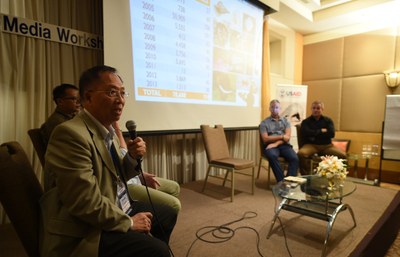P160 M worth of wildlife confiscated in past 7 years
A report by the DENR’s Biodiversity Management Bureau (BMB) said that the confiscation of the 21,000 wildlife specimens was the result of 212 enforcement operations conducted by the DENR Regional/Field Offices, wildlife enforcement officers, wildlife traffic monitoring units and Philippine Operations Group on Ivory and Illegal Wildlife Trade or POGI.
“At least 122 criminal complaints/cases have been filed in various courts. So far, 10 of the criminal cases filed have been resolved with the conviction of 19 crime perpetrators,” the BMB noted.
The report said commonly traded species are birds specifically hill myna or Palawan talking myna, raptors (kites, serpent eagles), hornbills, parrots and cockatoos. For reptiles, these are marine turtles, Philippine forest turtles, snakes, geckos and monitor lizards. For mammals, the most traded are pangolins and monkeys; and among arthropods, scorpions and tarantulas.
It also pointed out that Mindoro, Marinduque, Romblon and Palawan or Mimaropa region has the highest number of wildlife crime with 69 incidents recorded, 60 of which occurred in Palawan alone. The National Capital Region followed with 56, Calabarzon (Cavite, Laguna, Batangas, Rizal and Quezon) with 14, Region 3 with 13, and Regions 5 and 10 with nine.
“Five enforcement operations were registered for both Regions 11 and 13; four each in Regions 7 and 9; three each in Regions 6, 8, 12, and the Autonomous Region in Muslim Mindanao; and one each in Region 2, Cordillera Administrative Region and the Negros Island Region. Meanwhile, no wildlife apprehension was recorded in Region 1.”
A regional dialogue on wildlife trafficking between ASEAN member countries was recently held in Bangkok, Thailand. It aimed to strengthen regional collaboration and partnership among ASEAN member states including the Philippines in line with curbing trafficking of wild flora and fauna.
Dr. Wijarn Simachaya, permanent secretary of Thailand’s Ministry of Natural Resources and Environment, said the dialogue provides a regional platform that will focus on exchange of information, including best practices and challenges in order to strengthen the partnership to effectively combat illegal trade of tigers, pangolins, ivory and rhinoceros horn as well as Siamese rosewood.
Delegates from Brunei, Cambodia, China, Indonesia, Laos, Malaysia, Myanmar, Thailand, Vietnam and the Philippines, and representatives of international organizations and non-government organizations discussed the challenges, best practices on inter-agency cooperation, lessons learned, support needed and expertise they can offer on the issue of wildlife trafficking.
Earlier, an official said the Philippine government is working to eradicate the country’s image of being a transit point for illegal wildlife trade.
Ernesto Guiang, chief of party of USAID Protect Wildlife Philippines, said there are concrete moves to remove this negative label attached to the country.
“There are efforts to strengthen monitoring of the country as a transshipment point of illegal wildlife trafficking,” Guiang, who was part of the delegation to the Bangkok dialogue, said.
(This is first published in The Philippines Star. It is reported by Rhodina Villanueva, a journalist of The Philippines Star who participated in the Media Workshop on Combating Wildlife Crime in ASEAN and China, during September 12-15, 2017, in Bangkok and Nakorn Nayok, Thailand, organized by USAID Wildlife Asia)


